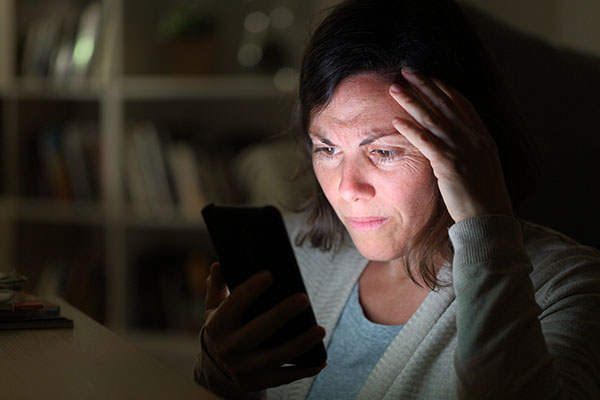Stress eating the news won't make you feel better

Stress eating.
We’ve all been there at some point. A whole bag of potato chips when we are lonely. A chocolate bar after a stressful situation at work. Eating when we are bored even though we aren’t hungry.
Stress eating is our brain’s attempt to make us feel better. And it works – temporarily. The burst of dopamine that gets released when we eat comfort foods is an antidote to the stress hormone cortisol. It tends to lift our mood in the moment. In the long-run, though, there can be a lot of unintended and unhealthy consequences to relying on food to manage our emotions.
.
Our brains do something similar when we are watching things on the news.
When what we are viewing is scary or when we don’t know when or how something will end, our fight-or-fight response releases the stress hormones adrenaline and cortisol. Once we are in the fight-or-flight state, our brains are highly attuned to threat and danger. We are focused on wanting to know: What is coming next? When will it be over? Am I safe yet?
Fear, uncertainty, and horrific images focus – and hold – our attention. Once we are scared and uncertain about what is coming next, or horrified at what we are seeing, we will keep returning to the same source of information to see if everything is okay yet.
But of course, that is never the message we receive. The media, with its activating colors, loud “Breaking News” sounds, divisive language, and images of the deep suffering of others is designed to fire the fear centers in our brains.
It is a vicious loop. Our fear brains are activated when we read/watch the news. We consume more news in the hopes of calming the fear and anxiety. We feel more scared and uneasy about what is coming or horrified at what we are seeing. We consume even more news in the hopes of calming the fear and anxiety.
Just like stress-eating the potato chips or chocolate, we stress-eat the news to try and make ourselves feel better. And sometimes it does give us the illusion of control – the more well-informed we are, the more we believe we can analyze our way out of the fear or predict what is coming next. But like the potato chip or chocolate fix, it is short-lived because there is always more information that fires up our emotional responses. In the long-run our emotions stay heightened and we feel worse.
So, what can we do if we want to stay abreast of what is going on but not have our emotions hijacked? It is important to stay informed, the trick is to make conscious choices about how and when we consume the news. Here are some things you can try to minimize the activation of the fear response:
1. Set designated times for checking the news. You get to choose, not your impulses.
2. Leave your phone in another room so you won’t be as tempted to check it constantly.
3. Get your news from less emotionally stimulating sources like PBS or the BBC.
4. Change the colors on your phone to grayscale. Which of these draws your attention more? For me, the grayscale images give me the information without the activation, making it less likely that I will addictively check my phone. I have instituted gray-scale only viewing when there are world crises happening.
5. Mute the volume on the TV during commercial break and don’t turn it back on again until after the “Breaking News” sound is over when the show comes back on. Even my dog responds to the “Duh-duh-duh-Dah” that happens when that Breaking News sound plays on CNN. When she hears it, she sits straight up in front of the TV, her attention totally focused on the screen, even if she had been laying down in another part of the room.
6. Move while watching tv or listening. Using resistance bands to exercise when watching the news splits your attention. You can listen to the information, but have something else to focus on so you are not getting sucked in. This also helps to reduce the stress hormones that are released when our fear response is activated.
The bottom line is that stress eating, whether it is potato chips, chocolate, or the news is not going to make us feel better in the long run.
Taking charge, setting limits, and feeling like you have agency are far more effective ways to stay balanced and sane when things in the world are making us feel scared and uncertain.
